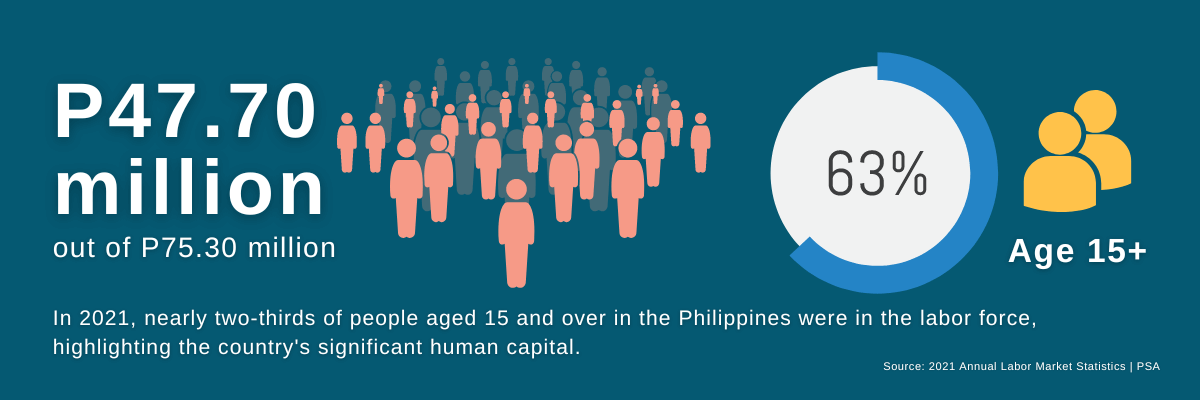Table of Contents
Why outsource to the Philippines? What value does your company gain from transferring operations to this country? Why should you hire a service provider based in the Philippines?
These questions might make you hesitate to do business in the Philippines. If you seek answers supported by facts and figures, you have come to the right place.
This article discusses why you should choose an offshoring provider in the Philippines. It talks about the main benefits of outsourcing to this Southeast Asian country.
Read until the end to learn more.
Reasons Why You Should Outsource to the Philippines

Below are the many advantages that business enjoy when partnering with offshoring companies in the Philippines.
Cost-effective and High-quality Workforce for Better Returns
The high quality of the workforce is one of the reasons why you should outsource to the Philippines. Filipino professionals have almost the same technical skills, soft skills, and level of education as professionals from relatively developed nations such as Malaysia, Singapore, and Mexico.
But while Filipino talent is on par with that of the countries mentioned, its labor costs are significantly lower. For instance, the average salary of a customer support agent in the Philippines ranges between $400 and $500 per month ($4,800 to $6,000 per year). The monthly salary of a similar position in Singapore is around $2,500; in Malaysia, $600; and in Mexico, $1,000 per month.
Lower operating costs allow business process outsourcing (BPO) companies to offer high-quality service at reduced prices. Thus, companies in the Philippines can charge low service fees compared to their high-salary counterparts.
The country’s low labor cost is due to an affordable cost of living. A single Filipino with a call center job can live decently with an average income of $400 to $500. That salary covers basic needs such as food, housing, utilities, and transportation.
Large, Young, and Technology-savvy Labor Force To Support Operations
The latest government census estimates the Philippine working-age population (between 15 and 64 years old) at around 75 million. Of these, almost 48 million were in the labor force in 2021. The labor force participation rate (LFPR) reveals six out of 10 Filipinos are employable. Additionally, the median age was 25 years old in 2020.
But what do these numbers mean for you? Simply put, companies that outsource to the Philippines have access to a large pool of Filipino millennials who are flexible with work setups, familiar with new technologies, and proficient in computer systems.
Every year, tens of thousands of skilled and qualified workers graduate from Philippine universities, colleges, and training centers. Most of them are adaptable, enthusiastic, and motivated. Additionally, Filipinos prioritize higher education. The country’s literacy rate in 2021 was 99.3%, a 1.4% increase from 2010.
The growing number of employable Filipinos favors the outsourcing industry. It means a labor shortage is unlikely to occur in the foreseeable future. When sufficient workers are in the market, wages tend to stay normal.
Improved Digital Infrastructure for Seamless Collaboration
The country’s internet infrastructure has significantly progressed over the past decade. Five more internet service providers (ISPs) started operations in the Philippines, bringing the total to seven ISPs. These providers mostly use fiber-optic technology to give people in major cities faster and more reliable internet connectivity.
This increased digital capability has immediate effects. According to the July 2022 Ookla Speedtest Global Index report, the country’s internet download speeds on fixed broadband and mobile have increased. They averaged 76 Mbps and 23 Mbps, respectively, up from 69 Mbps and 21 Mbps in June 2022.
The report adds that higher download speeds have advanced the worldwide ranking of the Philippines. In fixed broadband, it ranks 46th out of 182 countries; meanwhile, it ranks 84th out of 140 countries in mobile.
Starlink, a satellite internet service under Elon Musk’s company Space X, is expected to launch its broadband operations within the first half of 2023. It aims to connect isolated and far-flung areas. Starlink will provide these areas with a low-latency satellite internet connection, averaging a download speed of 100 Mbps to 200 Mbps.
The current administration also plans to support the country’s digital infrastructure by streamlining the issuance of local government unit (LGU) permits. With faster LGU approval, tech companies can quickly build fiber-optic networks and cellular towers, improving connectivity and internet speed even more.
Proficient in English for Better Customer Interaction
The Philippines has a large population of English speakers. In the EF English Proficiency Index (EF EPI), the country ranked second in Asia, following Singapore, and 22nd in the world.
These rankings prove its high English proficiency, especially considering the top 20 are mostly European nations. English is the country’s second official language, taught from kindergarten to college. So this ranking comes as no surprise.
High English fluency makes it easier to communicate and collaborate with Filipino talent. The U.S. and other English-speaking employers, customers, and clients can understand them clearly. So Filipino agents can discuss business, process transactions, and address service issues without language barriers.
In addition, most local professionals speak English with a neutral accent. They are also familiar with conversational and formal English. The Filipino English-language accent has an intonation different from that of a native speaker. But it is easier to listen to and understand than other English-language accents.
Filipinos’ English-language skills make outsourcing to the Philippines more attractive. BPO companies that rely on chat support, virtual assistance, customer support, and other back-office outsourcing services greatly benefit from these skills.
Cultural Similarities for Stronger Customer Relations
Cultural similarities contribute to the success of your outsourcing operations. Filipinos and Americans share many interpersonal expectations and behaviors, including diversity or multilingualism, strong family ties, holiday celebrations, and respect for elders. This is why it is easy for Filipinos to talk to Americans.
Additionally, the Philippines was a U.S. colony for 48 years (from 1898 to 1946) before becoming independent. During the occupation, the U.S. helped the Philippines govern itself by instituting its local government, economic development, and education systems.
Factors of the American lifestyle, such as music, food, fashion, and movies, were also introduced.
The Philippines also shares the following features with the U.S.:
- Government, business, and legal documents and records are in English.
- Government structure (executive, legislative, and judicial branches), insurance code, and criminal justice system are patterned after the U.S.
- Instructions and written examinations in most college and post-graduate education are in English.
- Most public and commercial signage, posts, and billboards are in English.
With strong cultural similarities and English skills, Filipinos can talk to Americans about anything, from ordinary topics of interest to technical subjects. Through the years, this lifestyle and language assimilation made Filipinos compatible with Western cultures. It gives them an advantage over other nationalities in delivering first-rate BPO services.
Favorable Laws To Spur Foreign Investments and Business Activities
The national government’s strong support for the BPO industry is another reason why you should outsource to the Philippines. It recognizes how important the sector is for creating jobs, taxes, and new technologies that help the economy and business climate.
The fact that the Philippine Economic Zone Authority (PEZA) has set up special economic zones all over the country is proof of this. When you outsource operations, such as data entry services, to any PEZA establishment or information technology (IT) park, the following benefits are available:
- Exemption from corporate income tax from four to eight years. When this ends, you pay only 5% gross income tax.
- Permanent resident status for foreign investors investing at least $150,000 in a sustainable local enterprise
- Exemption from import duties and assistance in import-export processes
Meanwhile, the Board of Investments (BOI) provides incentives (e.g., tax holidays and exemptions) to the IT business process management (IT-BPM) industry. Companies in this industry perform IT operations such as software development, data analytics, and artificial intelligence.
Other government initiatives include the following:
- The Philippine Council for Industry, Energy, and Emerging Technology Research and Development (PCIEERD) is an organization under the Department of Science and Technology (DOST) that provides training programs for BPO workers.
- Learning English Application for Pinoys (LEAP) is software that offers English classes to senior high school and college students nationwide. The program helps them meet BPO’s job requirements after graduation.
- Technical Education and Skills Development Authority (TESDA) is an agency that offers free English proficiency and call center training courses for Filipinos wanting to start a career in the BPO industry.
Continued Economic Strength for High Business Confidence
From 2010 to 2019, the Philippine economy grew at least 6% yearly in real gross domestic product (GDP). GDP measures the total value of goods and services produced in a nation in a certain period.
The 6% real GDP is considered above average and a sign of a healthy economy. This means consumer purchasing power, business investments, and government spending on public services are high. In other words, the majority financially and materially benefit from sustained GDP growth.
The continued stability over the past decade is attributed to the government’s prudent fiscal and economic policies. These policies have helped improve foreign debt payments, expand dollar reserves, increase public spending, and control inflation. Adding to these is the stable political climate and the previous administrations’ smooth transitions of presidential power.
The Philippine economy grew 5.6% in 2021, a significant improvement from 2020, when GDP slumped to nearly -10% due to the pandemic. Former socioeconomic planning secretary Karl Kendrick Chua says this growth performance was higher than expected and among the highest in the region. He said this is a favorable signal that the country is on track to recovery.
For 2022, government officials are optimistic the economy will meet the growth target of 6.5% to 7.5%. They also project the GDP to grow between 6% and 7% in 2023.

Thriving BPO Industry for Long-term Opportunities
The country’s first call center opened in 1992. But in less than 20 years, the Philippines has become the most popular place in the world to outsource work to. Its BPO industry is still evolving and filled with opportunities for foreign investors and companies.
Since its inception, the BPO industry has given millions of Filipinos jobs and brought billions of dollars into the country’s economy.
Despite the pandemic, the outsourcing sector reached its revenue and hiring targets in 2021 due to technology companies’ expansion. According to the IT and Business Process Association of the Philippines (IBPAP), the industry’s revenue increased by almost 11%, reaching $29.5 billion in the said year.
IBPAP adds that the industry employed close to 1.5 million workers in 2021, up by 9% or 120,000 additional jobs. The revenue increase exceeded the 5.5% growth mark, and the rise in new hires was roughly double its 5% target.
It notes that the suppressed demand (caused by the pandemic lockdowns) from e-commerce and fintech companies is the main driver for the growth. These companies depend on BPO services to reduce costs. IBPAP Chief Executive Jack Madrid says this global uptrend will continue, providing an opportunity for the outsourcing industry.
Flexible Work Shifts To Provide Nonstop Customer Service
Filipino workers in the back-office outsourcing industry are ready to work in shifts, whether in technical support outsourcing, customer service, recruitment, or bookkeeping. They are willing to work at night, on weekends, on holidays, and according to different time zones to serve customers, users, or clients regardless of location.
The U.S. is the Philippines’ biggest client country, and there is a 12-hour time difference between the two. Because they follow U.S. hours, nearly 60% of the local workforce works the night shift.
Time differences are not an issue among Filipino workers. Rotating shifts and weekend work are normal parts of the procedure. They are regarded as standard and accepted conditions in the BPO sector.
Outsourcing to the Philippines works to your advantage. For instance, your U.S. business can have in-house employees working during the day, while the third-party team takes over at night. That way, you are staffed with different people working around the clock.
This approach offers you these benefits:
- 24/7 accessibility. Your agents work in locations with different time zones. This means your business is available to customers regardless of time and place.
- Quicker response and resolution. Round-the-clock availability enables your agents to manage ticket queues and customer issues better. Consumers experience shorter wait time for their concerns since agents are always available to answer calls and messages.
Less Legal and Management Responsibilities To Reduce Costs
Your legal liabilities decrease when you outsource tech solutions, customer service, sales support, and other back-end activities to a Philippine BPO company. Setting up your own company in a different country involves following and keeping up with various regulations, compliance policies, tax laws, labor laws, and administrative measures.
Acquiring Philippine BPO services can protect you from the potential risks or legal repercussions of direct employee hiring. The country has an established labor law allowing employees to form labor unions for collective bargaining. With outsourcing, your BPO partner deals with staff-related issues, reducing your exposure to high financial costs and legal liabilities.
More importantly, your BPO partner helps supervise the team. It monitors and handles staff attendance, leaves reporting, and personal income taxes. All you have to do is to read and review your partner’s periodic reports.
Other advantages of outsourcing related to human resources (HR) include:
- Cost savings. Companies no longer need to spend extra on workspaces, software, office supplies, and computers.
- Experienced professionals. A service provider has a qualified HR team to manage processes and job-related concerns. It also hosts activities to encourage cultural diversity and keep work relationships in harmony.
- Extensive connections. A BPO company has access to a wide local talent pool, allowing you to pick the best candidates for the job.
Positive Work Traits for High Productivity and Performance
Lastly, Filipino professionals’ positive work traits are one reason why you should outsource to the Philippines. Here are some examples:
- Focused on service. This characteristic gives the local contact center industry an advantage over its foreign counterparts. Filipino employees are interested in other people, especially foreigners, and are known for their warmth and hospitality. Most are team players, allowing them to provide excellent service.
- Diligent and creative. Local professionals are generally hardworking and treat work colleagues as their second family. They work hard to provide for their families and exhibit patience, humility, and confidence.
- High respect for superiors. Filipino workers show their respect to officers, leaders, and older individuals by calling them “ma’am,” “sir,” “TL (team leader),” or “boss.” This signifies they possess the work discipline, commitment, and obedience needed to succeed.
- Upbeat attitude. Filipinos are naturally cheerful. This behavior is notable during conversations and when working with them. They often smile, make and laugh at jokes, and give warm greetings. A bright work attitude enhances productivity, teamwork, and customer relations.
- Dependable workers. Filipino employees are reliable. Once settled into their work, they complete their tasks with minimal supervision. They are quick learners and show great enthusiasm and active listening skills, making them dependable workers.
The Bottom Line

Are you now convinced that you should outsource to the Philippines? For quick reference, here is a summary of the benefits of outsourcing to the country:
- Low-cost with a large, excellent, English-speaking, and adaptable workforce
- Investor-friendly business and economic environment
- Well-established and booming local BPO industry
If you want to reduce costs and increase revenue, outsourcing business processes to the Philippines should be on your list.
Contact a BPO provider such as Unity Communications to help you develop a customized, effective outsourcing strategy in the Philippines.




